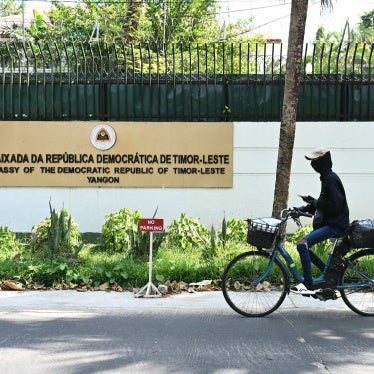(New York) - The award of the 2009 Nobel Peace Prize to US President Barack Obama should encourage him to apply his stated principles to both foreign and domestic human rights policy, Human Rights Watch said today.
The Nobel committee awarded the prize for "extraordinary efforts to strengthen international diplomacy and cooperation between peoples," and Obama said he would accept it "as an affirmation of American leadership on behalf of aspirations held by people in all nations." Human Rights Watch said Obama should now act decisively to end abuses in US counterterrorism policy, promote accountability for serious human rights crimes wherever they occur, and push for the protection of human rights defenders worldwide.
"As a Nobel laureate, President Obama has a special responsibility to speak up for activists jailed and persecuted for promoting human rights," said Kenneth Roth, executive director of Human Rights Watch. "The president will honor his Nobel Prize when he puts a meaningful end to the debacle at Guantanamo, by trying or releasing all of the prisoners held there."
Human Rights Watch said Obama should use his status and celebrity to protect human rights activists under threat or marginalized, including Nobel laureates Aung San Suu Kyi, the Dalai Lama, and Shirin Ebadi, and other reported candidates for the prize such as the Chinese dissidents Hu Jia, Liu Xiaobo, Gao Zhisheng and Chen Guangcheng, the Egyptian opposition leader Ayman Nour, and the Russian human rights group Memorial.
Obama, who said the prize "must be shared with everyone who strives for justice and dignity," spoke of "the young woman who marches silently in the streets on behalf of her right to be heard even in the face of beatings and bullets; for the leader imprisoned in her own home because she refuses to abandon her commitment to democracy." The latter was a reference to Aung San Suu Kyi, the Burmese leader who has been jailed or under house arrest for almost two decades.
However, Human Rights Watch said Obama - who was recently unwilling to meet the Dalai Lama - should push for a vigorous public discussion of Tibet during his Beijing visit in November.
Obama should also institute real reforms on counterterrorism issues, Human Rights Watch said. The president signaled his clear intention to repudiate the Bush administration's abusive legacy on his second full day in office by announcing the shutdown of CIA "black sites" and the planned closure of the military prison at Guantanamo. But he later backtracked significantly from his promise of reform by resurrecting the failed system of military commissions and suggesting that his administration would continue to hold some prisoners in preventive detention.
Human Rights Watch said Obama should end the practice of arbitrary detention by abolishing Guantanamo. Simply moving the prisoners from Cuba to the United States, as his administration has signaled it may do, will not solve the problem, but rather give it a new name.
US counterterrorism abuses had been a boon to terrorist recruiters and a key irritant in relations between the United States and the Muslim world, Human Rights Watch said. By eliminating these abuses - and bringing to justice those responsible for such abuses - Obama's reforms would lessen the likelihood of future conflict.
The Obama administration has strongly defended the principles of international justice as applied to Congo, Kenya, and Sudan, but changed its position when the UN Goldstone report urged investigation of Israel and Hamas for possible war crimes. Human Rights Watch urged Obama to apply those principles to all parties, regardless of whether they are US allies or not.
"Justice is a critical component for lasting peace, because impunity for perpetrators of serious crimes fuels further violence," Roth said. "President Obama should use his leadership to press for justice for all victims of human rights abuses, wherever they live."








